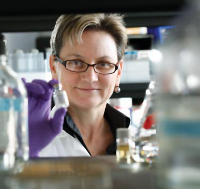Knowledge District: Five scientists whose cutting-edge research is giving the historic jewelry district a new name
With the rerouting of I-195 in Providence and the dismantling of the decrepit old highway that cut off one corner of the city, the overlooked Jewelry District, once the city’s manufacturing engine, is now the site of high-tech economic development. Local officials are looking to rename the area the Knowledge District, and are pushing for more federal grant money to develop a job-generating cluster of medical research labs. Already there are a number of projects that score high marks on the gee-whiz scale and may someday help treat or cure some of the worst diseases.
Link to full article by Mark Arsenault in Rhode Island Monthly: www.rimonthly.com
Article excerpt continues below:
 Anne de Groot Epivax
Anne de Groot Epivax
Location: Clifford Street
A breakthrough in fighting autoimmune diseases
The scientific “aha” in Dr. Anne De Groot’s research came in 2007, when her biotech company, EpiVax, Inc., turned its attention to an overlooked scrap of protein that De Groot believes will revolutionize treatment for some of the most serious chronic diseases.
“This molecule I think has the potential to be a complete paradigm shift for the way we’re going to think about inflammation, autoimmune diseases, transplantation, type 1 diabetes, even perhaps vaccines,” says De Groot, a researcher, professor and business owner, who founded her company in 1998.
EpiVax helps pharmaceutical companies develop vaccines. But while doing that work, says De Groot, the company stumbled upon the molecular trigger that tells the immune system to calm down. Understanding why De Groot is so excited by this discovery needs a little explanation.
Greatly simplified, the body has mechanisms to regulate the immune system. When bacteria or a virus are discovered, the immune system releases the hounds and attacks the intruder. The cells responsible for shutting down the system later — for putting the hounds back in the pen — have been known for years, but nobody knew what got them to act, says De Groot. “And we found that thing.”
Why would we want to shut down immune response?
Because sometimes the immune system gets confused and starts attacking things we really need. “That’s autoimmune disease,” she says. “You start attacking your nerves, that’s multiple sclerosis; you start attacking your pancreas, that’s juvenile diabetes, or you attack your thyroid, that’s thyroid disease.” The immune system also attacks transplanted organs, requiring drugs that suppress the whole system. “We found the switch that shuts off an immune response where it’s happening,” says De Groot. “If you have inflammation in your pancreas you don’t want to be shutting down an immune response to flu in your throat. So we can target shutting off that immune response. It could replace a lot of toxic therapies. For us it’s a huge discovery and it’s exciting.”
EpiVax is collaborating with laboratories to study ways to turn the discovery into a treatment. “Ten years from now, you will see this particular molecule being a lynchpin in the first intervention for those (autoimmune) diseases. To have something that could have such a profound impact on making people feel better is what any scientist would want to achieve.”
De Groot comes from a family of artists and scientists, and she is a bit of both. “What’s so great about science is that it’s being an artist in a different medium. The kinds of connections we make between concepts are very similar to the connections an artist would make. If you question dogma, which is a great thing for an artist, then you’ll probably do really great science. That’s our motto — science without fear.”
